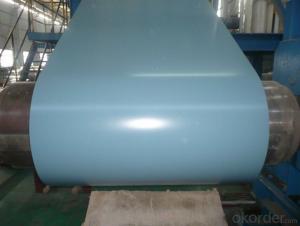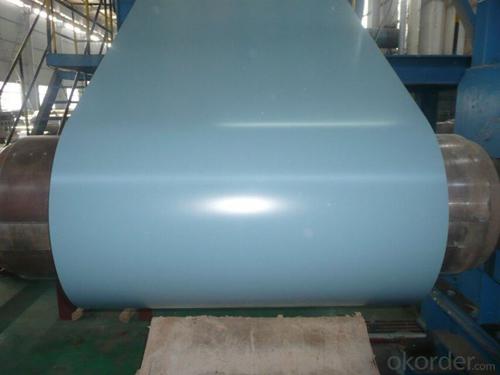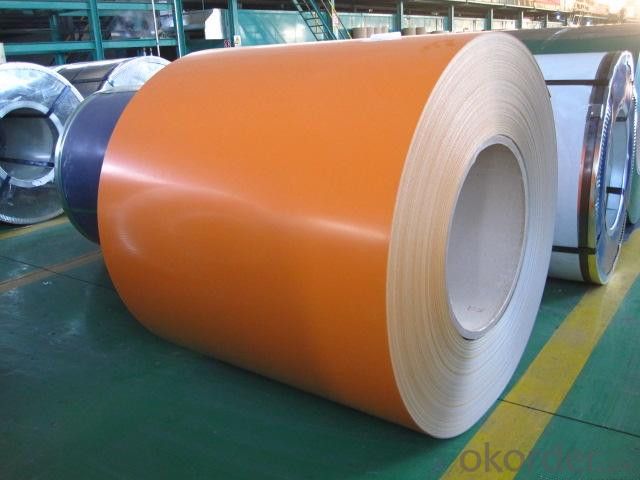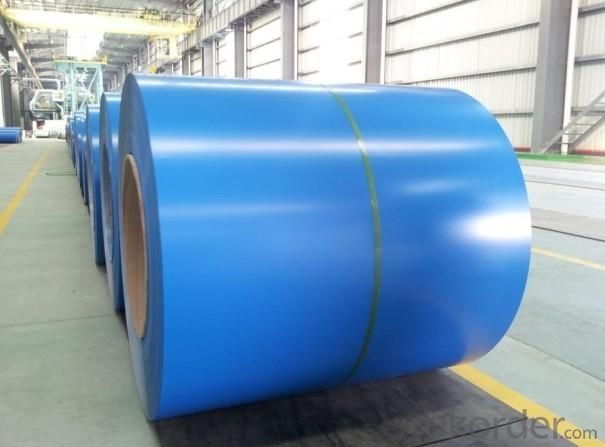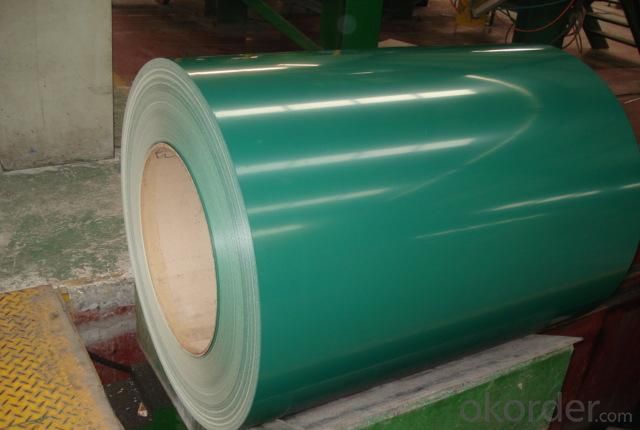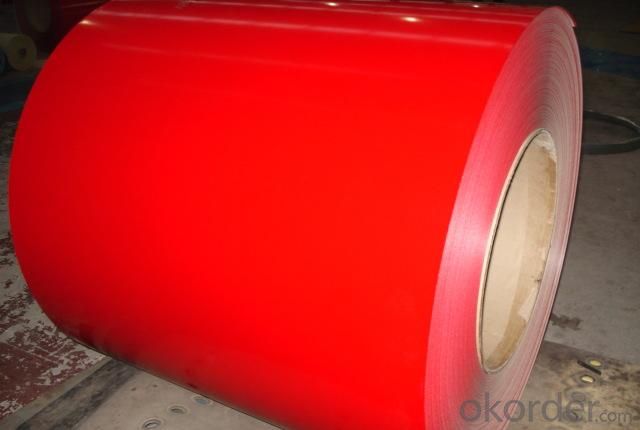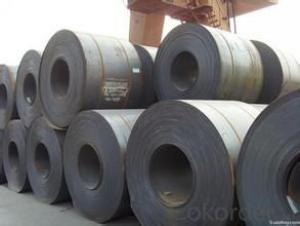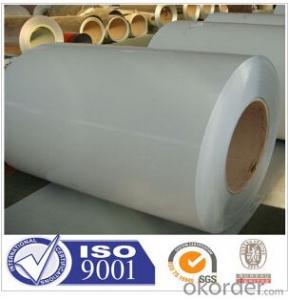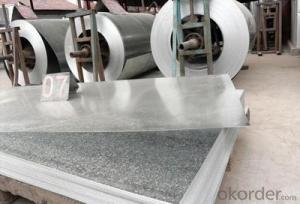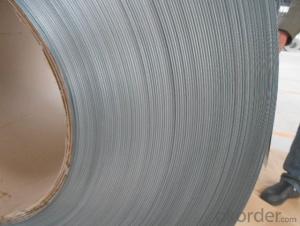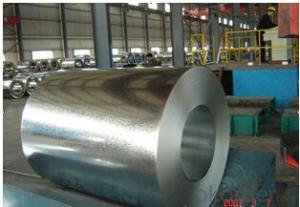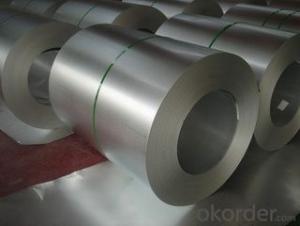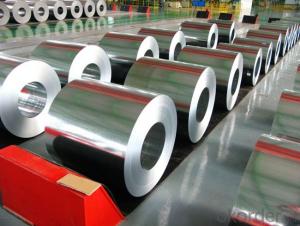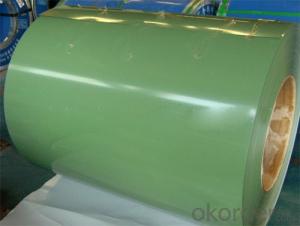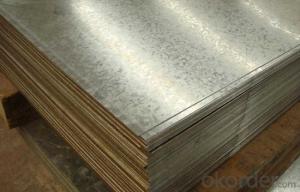Galvanized Steel in GI Coil
- Loading Port:
- China main port
- Payment Terms:
- TT OR LC
- Min Order Qty:
- 5 m.t.
- Supply Capability:
- 100000 m.t./month
OKorder Service Pledge
OKorder Financial Service
You Might Also Like
Specification
Galvanized steel in GI coil
Specifications
Thickness: 0.12-1.5mm
Width: 20-1250mm
Zn: 60-275g/m2
Grade: SGCC, DX51D, DC51D, ETC.
NAME | PPGI | GALVANIZED | GALVALUME/ALUZINC |
CERTIFICATE | ISO9001:2008 | ||
STANDARD
| EN10142 JIS G3302 GB/T-12754-2006 | ASTM A653 JIS G3302 SGCC/SGCH GB/T2518 European Standard | ASTM A792 JIS G3321 JIS G3317
|
GRADE
| CGCC CGCH CGCD1-CGCD3 CGC340-CGC570 GRADE
| SS GRADE33-80 SGCC SGCH SGCD1-SGCD3 SGC340-SGC570 SGCC DX51D | GRADE33-80 SGLCC SGLCD SGLCDD SGLC400-SGLC570 SZACC SZACH SZAC340R |
Mode No of prepainted steel coil | 0.14MM-1.5MM*1250MM OR UNDER | (0.14-1.5)*1250MM OR UNDER | 0.14MM-1.5MM*1250MM OR UNDER |
Type of prepainted steel coil
| Steel coil Steel sheets/plates Corrugated steel sheets/plates
| Steel coil Steel sheets/plates Corrugated steel sheets/plates | Steel coil Steel sheets/plates Corrugated steel sheets/plates
|
Technique of prepainted steel coil | Hot rolled-cold rolled -galvalume /galvanized -PPGI/PPGL | Hot rolled-cold rolled - galvanized | Hot rolled-cold rolled -galvalume /Aluzinc
|
Surface treatment of prepainted steel coil | Mini/regular/big/zero spangle, Chromate treatment /chromate-free treatment /untreated unoile/oiled, TENSION LEVELLERT SKIN PASS anti-fingerprint/un-anti-fingerprint, Coating,color | Mini/regular/big/zero spangle, Chromate treatment /chromate-free treatment /untreated unoile/oiled, TENSION LEVELLERT SKIN PASS anti-fingerprint/un-anti-fingerprint, Coating
| |
Application of prepainted steel coil | Structural use ,roofing, commercial use, household appliance, industry, family | ||
SPECIAL APPLICATION | Wear resistant steel, high- strength - steel plate | ||
Color coated steel sheets are a new-type pre-coated steel product developed rapidly in the past thirty years. Color coated steel sheets are made on high-speed continuous coating lines through a number of processes such as chemical pretreatment, primary coating and finish coating, thus they have better coating quality than single piece coating.
Color coated steel sheets feature excellent decorativeness, bendability, corrosion resistance, coating adhesion and color fastness. They are ideal substitutes for wood panels in the construction industry because of their good economic features such as convenient installation, conservation of energy and resistance to contamination.
The rapid development of color coated steel sheets is mainly attributed to their good economic, social and environmental properties. They are being used in more and more areas.
Structural Diagram of Color Coated Steel Sheet
| Technical specification: |
| The size range of our color coated steel sheet |
| Thickness(mm): 0.14-1.2 |
| width(mm): 700-1250 |
| Max steel roll weight(kg):6000 |
| Inside diameter of steel roll(mm):508 |
Scope of Application: Exterior decoration of buildings: Roof and wallboards of industrial, commercial, residential and public facilities Home appliances: Oil/gas boilers, rice buckets, portable gas burners, etc.
|
Packing
Each bare coil to be securely tied with two bands through the eye of coil (or not) and one circumferential, the contact points of these bands on the coil edge to be protect with edge protectors. Coil then to be properly wrapped with water proof /resistant paper, it then to be properly and completely metal wrapped. And each packed coil to be properly wrapped with band, three-six such band through the eye of coil at about equal distance, and two-four such bands securely tied around belly of coil at about equal distance.
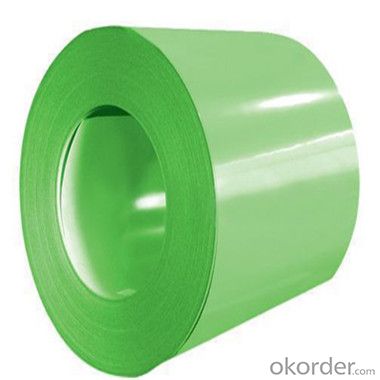
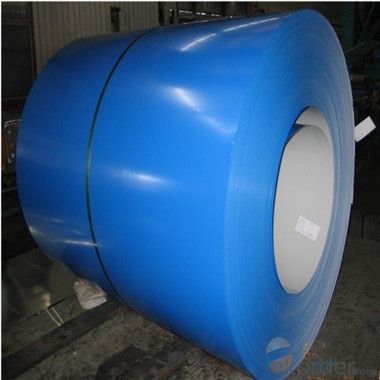
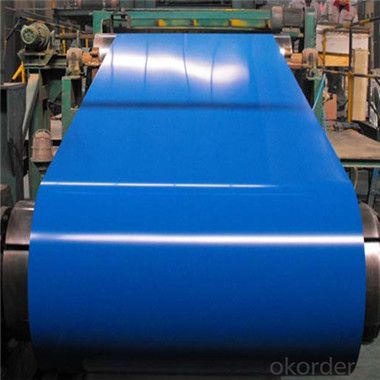
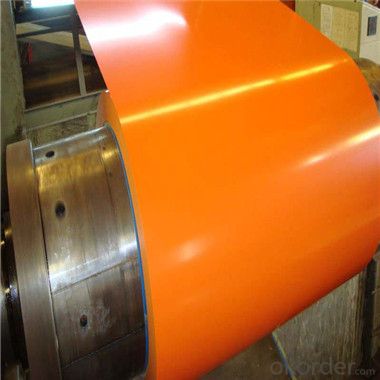
- Q: im playing fallout 3 on ps3 and im at project purity. i keep dying and i heard about broken steel how or what is that plz help me out thnx.
- There is no way to survive that bit, you always die. That's why you save just before you do that quest, leave, do EVERYTHING ELSE there is to do, and then when you're finally sick of the game do it. Anyway Broken Steel is a DLC pack for Fallout 3 that makes you survive that. It ups the level cap, continues the game, adds new missions and weapons and adds tougher monsters to fight. It's one of the best DLC for the game IMO. I'm not sure if it's released yet for the PS3 version, but it will be out soon if it isn't. Check the Playstation store from the PS3 main menu.
- Q: looking for a good pocket knife. i keep going through these 440 steel pocket knives with every day work usage. this will be my 4th. even when i use a whetstone they stay sharp for a short period of time but the edge does not last, 440 is too soft! what is a good steel to look for in a pocket knife? also what are some good brands. ive been using gerber and buck sofar. if you could recommend me a few mid/small sized knives i would greatly appreciate it!
- This Site Might Help You. RE: best folding pocket knife or best steel for them? looking for a good pocket knife. i keep going through these 440 steel pocket knives with every day work usage. this will be my 4th. even when i use a whetstone they stay sharp for a short period of time but the edge does not last, 440 is too soft! what is a good steel to look for in a pocket knife?...
- Q: can anyone tell me the way to bring back the shine to the stainless steel kitchen sink . It has become dull.
- Lowe's has a stainless steel cleaner/polish....it works great!!
- Q: What are the main challenges in handling and processing steel coils?
- The main challenges in handling and processing steel coils include their large size and weight, which require specialized equipment and techniques for safe transportation and storage. Coils also tend to have sharp edges, posing a risk of injury. Additionally, maintaining the integrity and quality of the steel during processing can be challenging due to the potential for surface damage, rust, or deformation. Proper handling, storage, and processing techniques are crucial for minimizing these challenges and ensuring the efficient production of steel products.
- Q: How do steel coils contribute to the marine industry?
- Steel coils contribute to the marine industry by being used in the construction of ships and offshore structures. They are essential for manufacturing various components, such as hulls, decks, beams, and structural supports. Steel coils provide strength, durability, and corrosion resistance, ensuring the longevity and safety of marine vessels and infrastructure. Additionally, steel coils are used for the production of marine equipment, including cranes, winches, and anchor chains, further enhancing the efficiency and functionality of the marine industry.
- Q: I have a steel garage, it looks worn out hauled away? How can I maintain / repair it?
- The entire garage is steel? Garage door? Are you able to open and close it without too much trouble? If so, just keep it lubricated. You could paint the door to improve its appearance.
- Q: What are the different methods of edge trimming steel coils?
- There are several different methods used for edge trimming steel coils, depending on the specific requirements and preferences of the manufacturer. Some of the common methods include: 1. Slitting: This is a widely used method where the coil is passed through a set of rotating circular blades to cut the edges of the steel coil. Slitting allows for precise trimming of the edges and can be used for various thicknesses of steel coils. 2. Milling: In this method, the edges of the steel coil are trimmed using milling cutters, which remove the excess material to achieve the desired edge finish. Milling is often used for thicker steel coils or when a specific edge profile is required. 3. Shearing: Shearing involves the use of a sharp blade to cut through the steel coil along a straight line. This method is commonly used for thinner steel coils and provides a clean and straight edge. 4. Laser cutting: Laser technology is also employed for edge trimming steel coils. A focused laser beam is used to melt or vaporize the excess material, resulting in a precise and smooth edge. Laser cutting is often used for thinner gauges or when intricate shapes or patterns are required. 5. Water jet cutting: This method utilizes a high-pressure stream of water mixed with abrasive particles to trim the edges of the steel coil. Water jet cutting offers a versatile and precise cutting solution, especially for thicker steel coils and complex shapes. It is important for manufacturers to carefully evaluate their specific requirements, such as coil thickness, desired edge finish, speed, and cost, in order to select the most appropriate method of edge trimming for their steel coils.
- Q: I completed the missions in broken steel like: the one of the rangers, the one of vault 101, the one of the enclave, and several others.are there any more INTERESTING missions?
- Nah the rest really aren't that intresting. i usually just walk around looking for missions............ and caps
- Q: What is the role of steel coils in the production of conveyors?
- Steel coils are used in the production of conveyors as they serve as the main structural component for supporting and guiding the conveyor belt. These coils are typically formed into a cylindrical shape and act as a sturdy foundation for the belt to rest on. Additionally, the strength and durability of steel coils ensure that the conveyor can withstand heavy loads and constant movement, making them essential for efficient and reliable conveyor systems.
- Q: I have a set of steel pans with copper bottoms. When I cook with oil it always burns the oil to the pan and takes days to clean. I don't think I should use steel wool, since it might scratch the surface. Does anyone know a faster way to clean scorched oil off a steel pan?
- Use a Mr. Clean Magic Erasure. I swear, you will be amazed at how easily it gets your pots and pans clean! It shines them right up! That oil will come right off. Make sure you do wash it with dish soap and warm water after using the Magic Erasure.
Send your message to us
Galvanized Steel in GI Coil
- Loading Port:
- China main port
- Payment Terms:
- TT OR LC
- Min Order Qty:
- 5 m.t.
- Supply Capability:
- 100000 m.t./month
OKorder Service Pledge
OKorder Financial Service
Similar products
Hot products
Hot Searches
Related keywords
